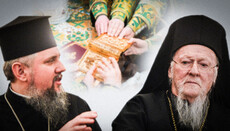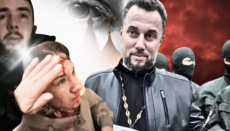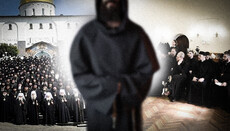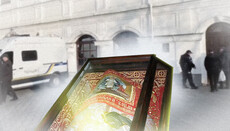Killing an invader: Is it a sin or not?
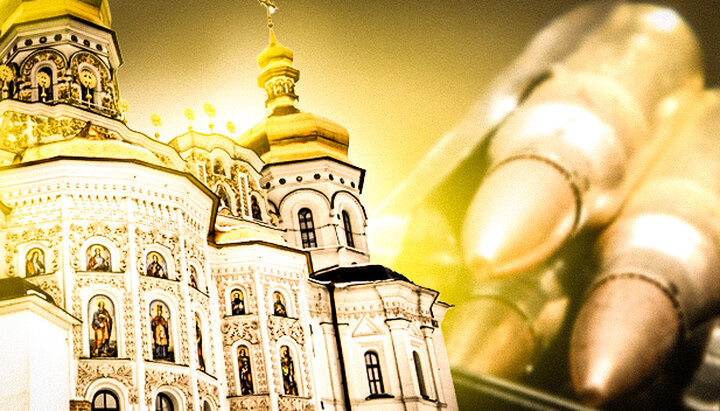
Politicians and reporters call to exterminate the occupiers; the top of the OCU declares it is not a sin to kill them. What does the Church of Christ say on this issue?
The war has been going on in Ukraine for three weeks. Hundreds and thousands of citizens of Ukraine are dying. We lose loved ones, our homes; we are separated from relatives. Righteous anger towards the occupier is raging in our hearts. But are there limits to this anger? Is it permissible to kill the families of the aggressor, his children? What about being a Christian? Can a person who lives according to the Gospel kill an occupier? Is it a sin? Is it possible to find a compromise between Christ's commandments and the need to defend the country?
On March 12, 2022, reporting the death of his friend, the host of Channel 24, Fakhrudin Sharafmal, quoted the words of one of the ideologists of German Nazism, Adolf Eichmann:
“In order to destroy a nation, it is necessary, first of all, to exterminate children, because if only parents are killed, children will grow up to certainly take revenge; but if children are killed, they will never grow up, and the nation will disappear.” At the same time, Sharafmal added, “The Armed Forces of Ukraine cannot destroy Russian children, since this is prohibited by the rules of war and various conventions, including the Geneva ones. However, I am not from the Armed Forces of Ukraine, and when I get a chance to deal with the Russians, I will definitely do it. I will adhere to the doctrine of Adolf Eichmann and will do everything in my power so that neither you nor your children will ever live on this earth <...> We need victory, and if all your families have to be slaughtered for this, I will be one of the first to do it."
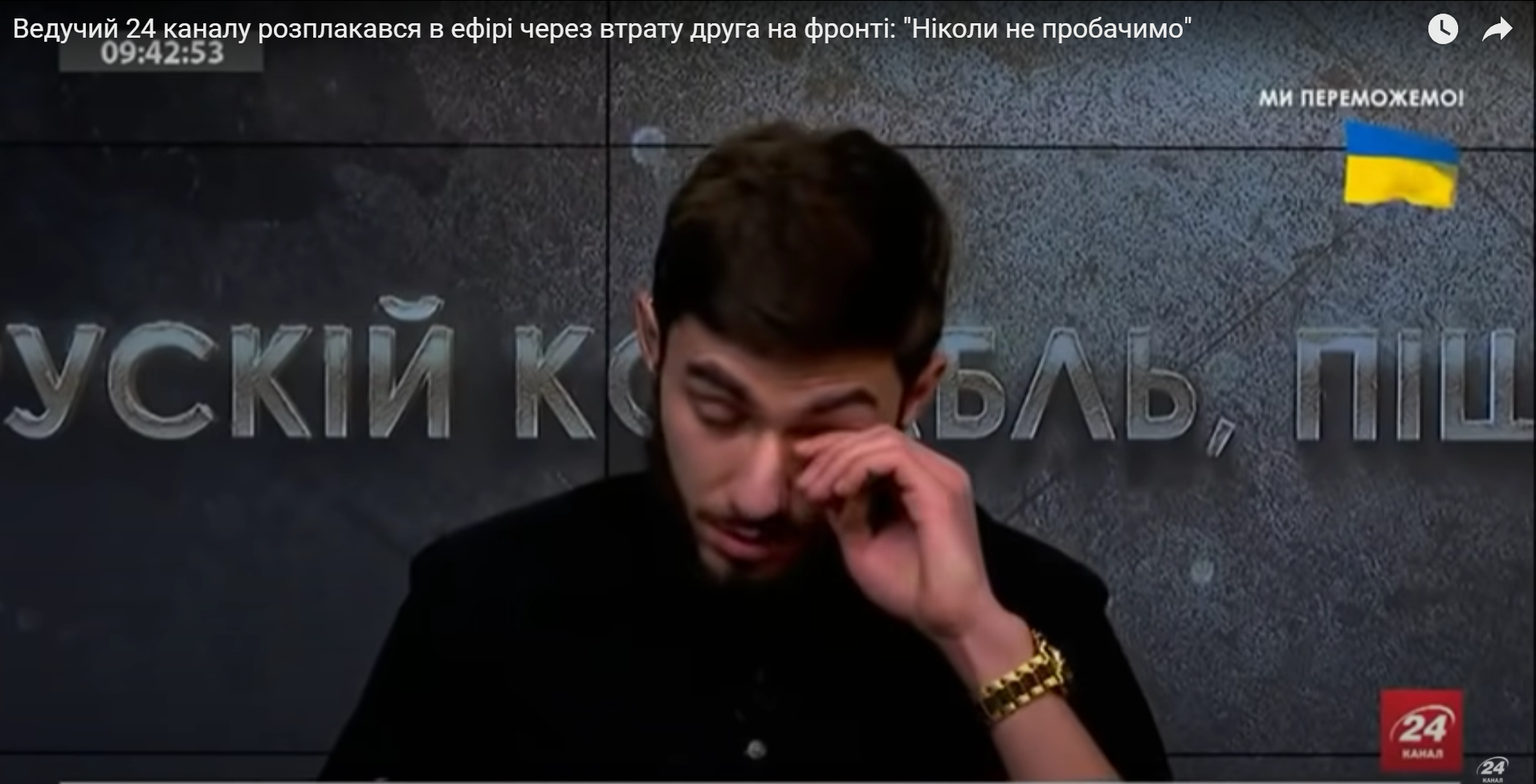
In fairness, it must be said that a few days later he apologized for his words, albeit in a peculiar form: “I apologize, because it was unacceptable from the point of view of a journalist and from a human point of view. Ukrainians are not such non-humans as Russians; first of all, we are people.”
Similar threats to the wives and children of the occupiers appeared on March 17 on the Fb page of the head of the State Border Service, Sergei Deineka, following the death of a group of Ukrainian border guards. True, Deineka later stated that his page had been hacked.
The examples given are by no means an exception; anger and hatred, which are caused by the death of fellow countrymen and friends, are now very common among Ukrainians. This can be understood on a human level. Anyway, these are secular people – but what about Christians?
On March 7, OCU “Metropolitan” Mikhail Zinkevich declared that killing “Rascists” is not a sin and that one doesn’t even need to go to confession: “If the enemy shoots at your house, shoots at your neighbors, then this is the enemy of God ... This enemy must be destroyed . There is no sin in this. You don't even have to go to confession."
The head of the OCU, Sergei Dumenko, said about the same on the air of the telethon: “We do not seek to kill our neighbors. But since they came to our home, we are defending our Motherland, hence defending it even through killing the enemy is not a sin.”
From the point of view of a patriot defending himself against an aggressor, the words of the "hierarchs" sound convincing. How about a Christian? Is killing amid warfare not a sin indeed?
Holy Fathers on Murder in War
Despite the fact that most of the holy fathers did not identify the commandment “Thou shalt not kill” with murder in war, there are those among them who categorically denied the possibility for Christians to kill and even engage in warfare.
Saint Hippolytus of Rome (170-235), under pain of anathema, forbids Christians to enter military service. It is forbidden to kill even for those who are warriors: "Who has accepted the power to give orders to kill, even a rank-and-file soldier, should not do this under any circumstances, even if they receive an order." For those who are guilty of shedding blood, the saint provides for penance: “A Christian should not be in the army, except when he is forced to take up a sword. In that case, let him not take upon himself the sin of shedding blood. Nevertheless, if blood is shed, he should be removed from the sacraments, so that he will be purged at least through punishment, tears and lamentations."
If blood is shed, the warrior should be removed from the sacraments, so that he will be purged at least through punishment, tears and lamentations.
Saint Hippolytus of Rome
At the same time, other holy fathers not only justify the killings in the war, but praise the soldiers who defend the homeland with weapons in their hands. Thus, in his Epistle to the Monk Amun, St. Athanasius the Great (4th century) writes: “It is not permissible to kill, but to exterminate the enemy in war is both legal and worthy of praise; therefore, those who distinguished themselves in battles are awarded great honors, and monuments are erected to them, heralding their merits."
Blessed Augustine expresses a similar opinion: “Therefore, those who wage wars by authority from God or as representatives of public authority by virtue of His laws (that is, in view of the most reasonable and just order) do not violate the commandment not to kill, punishing the villains with death.”
Some holy fathers make a distinction between participation in a just and unjust war. So, the Monk Isidore Pelusiot writes: “We should not blame all those who wage war; those who initiated either the infliction of offense or theft are justly called destructive demons; those who avenge moderately should not be reproached as acting unjustly."
In addition, in the book of Deuteronomy, after the commandment “thou shalt not kill,” there is a command to destroy the peoples that inhabited Palestine: “You must destroy all the peoples the LORD your God gives over to you. Do not look on them with pity and do not serve their gods, for that will be a snare to you” (Deut. 7:16), as well as a whole list of crimes for which the guilty should have been killed.
At the same time, idolatry was considered the most criminal thing in this regard: “If your very own brother, or your son or daughter, or the wife you love, or your closest friend secretly entices you, saying, ‘Let us go and worship other gods’ (gods that neither you nor your ancestors have known, gods of the peoples around you, whether near or far, from one end of the land to the other), do not yield to them or listen to them. Show them no pity. Do not spare them or shield them. You must certainly put them to death. Your hand must be the first in putting them to death, and then the hands of all the people. Stone them to death, because they tried to turn you away from the LORD your God, who brought you out of Egypt, out of the land of slavery.” (Deut. 13:6-10).
Based on the foregoing, one might get the impression that the representatives of the OCU are right to say that the killing of Russian servicemen is not a sin. However, they are not.
The fact is that since the time of the Old Testament, the taking of human life under any circumstances has been deemed as something that contradicts God's plan for man. Even in a just war, the one who commits murder takes on the sin and needs repentance and purification.
Even in a just war, the one who commits murder takes on the sin and needs repentance and purification.
The Monk Isidore Pelusiot (4th-5th century) writes: “Although the killing of enemies in wars seems to be a legal matter and monuments are erected to the winners, proclaiming their merits; however, if we analyze the close affinity between all people, then it (mortification) is not innocent; why Moses ordered that the one who killed a man in the war be subject to purification and sprinkling. Here we are talking about the fact that after the war of the Israelites against the Midianites, which was started by the direct command of God, the prophet Moses tells the soldiers the following: “Anyone who has killed someone or touched someone who was killed must stay outside the camp seven days. On the third and seventh days you must purify yourselves and your captives” (Numbers 31:19).
In the same way, St. Basil the Great prescribes penance for those who came from the war: “Our fathers did not consider murders committed in the war as murders: in my opinion, they wanted to grant forgiveness to those who fought in the name of prudence and love. But perhaps they (the soldiers) should be advised to abstain from communion for only three years, since their hands are not clean.”
The canonist of the 13th century, Matthew Vlastar, comments on this Rule as follows: “It is necessary that those who spend their lives in battles and stain their hands in the blood of foreigners are first purged by the medicine of repentance and burn by fire the filth associated with such an occupation and thus proceed to the sacraments of the new Adam.”
Soldiers should be advised to abstain from communion for only three years, as their hands are not clean.
Saint Basil the Great
A very telling story took place in the 10th century. in Byzantium, when Emperor Nicephorus Foka, who waged numerous wars in the east against the Arabs, asked the Patriarch of Constantinople and the Synod to equate those killed in the war with the holy martyrs in order to raise the morale of his soldiers. From his point of view, this was justified, since his Muslim opponents gladly went to their death, believing that a Muslim who died during jihad immediately goes to heaven. However, the Orthodox hierarchs refused and at the same time referred to the Rule of Basil the Great.
Thus, the ecclesiastical teaching on this issue can be worded as follows: killing an enemy in a just war is a violation of the Divine plan for a person. Although it is justified by the need to protect his people, a warrior, like an ordinary killer, needs repentance and purification.
Give me your heart
“Son, give Me your heart” (Prov. 23:26), says the Lord in the Old Testament; “Blessed are the pure in heart, says the Savior, for they shall see God” (Matthew 5:8); “Create a pure heart in me, O God, and establish a right spirit in my womb” (Ps. 50:12), says David; The apostle Paul desires that Christ dwell in the hearts of Christians (cf. Eph. 3:17).
One can quote the words of the Church Fathers about warriors and war for a long time. But it is necessary to understand the following: the main thing for a person, including a warrior, is peace and love in his heart. Killing an enemy is hardly possible without anger and hatred in the soul. These passions have no place in the soul of a Christian.
The Monk Ambrose of Optina writes: “The Lord did not give this commandment ('Thou shalt not kill' – Ed.) at all, but only brought this commandment from the Old Testament: 'You heard what was said of the ancients (that is, in the Old Testament): do not kill’ (Matthew 5:21). The real commandment of the Lord is this: ‘But I tell you that anyone who is angry with a brother or sister will be subject to judgment’ (Matt. 5:22). You see that the Lord does not forbid murder, which was forbidden in the Old Testament, but, as the Maker of the law, He tries to eradicate the very passion of anger from the human heart, from which people sometimes go as far as murder.”
These words contain the answer to the question: is it a sin to kill in war or not? The Lord speaks not so much about the specific actions of a person, but about the state of his soul, which will be crucial at the Judgment of God. A person can have anger, fury and hatred in his heart and, moved by these sinful passions, kill enemies in war, or he can have a feeling of compassion for his neighbors, sacrificial love for them, a desire to protect them from evil, humble submission to authority – and at the same time kill enemies in war. The action may be the same, but the state of mind and consequences for the human soul are completely different. Sinful passions, according to the teaching of the Holy Fathers, are subject to God's punishment unless a person repents.
Position of the UOC
The Ukrainian Orthodox Church calls on its faithful to stand up for the defense of their native land. The Appeal of the Holy Synod to the Ukrainian people says, “In such a difficult situation, we call on everyone to be courageous, intensify prayer and unite around the defense of our Motherland. Addressing all our defenders today, we want to testify that we honor you and pray for you, because you, sacrificially risking your life, effectively bear witness to how you can fulfill the words of our Lord Jesus Christ 'Greater love has no one than this: to lay down one’s life for one’s friends'" (John 15:13).
At the same time, the UOC reminds us that we must not allow sinful passions to seize our soul, but, on the contrary, we must preserve peace, love and virtue.
“Ukrainian people, brothers and sisters! We hope that common sense will prevail and this war will end soon. We ask each of you to keep peace among yourselves and not succumb to provocations. Help each other, take care of each other. It is also important not to stir up hostility among themselves. Only in unity is our strength. We pray the Lord to enlighten the rulers with the light of His grace. We believe that the human-loving Lord will accept our prayerful efforts, forgive us our sins, and in the near future, the peace of God will once again reign on our blessed Ukrainian land!” the Synod’s Address reads.
One can compare these words with what representatives of other Ukrainian confessions are calling for and conclude who is the true shepherd of Christ's flock and who is not.
